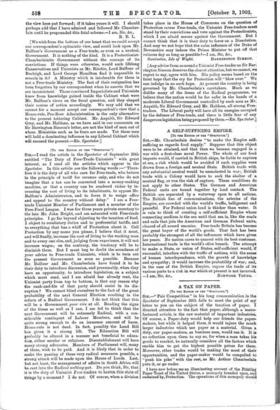fTo as EDITOR OP THE “EneeeraTea."1 read the article in
the Spectator of September 26th entitled "The Duty of Free-Trade Unionists" with great interest, as I read all the articles which appear in the Spectator. In this article are the following words :—" There- fore it is the duty of all who care for Free-trade, who believe in the principle of tariff for revenue only, and who do not imagine that a tax can be converted into a money-making machine, or that a country can be rendered richer by in- creasing the cost of living to its inhabitants, to oppose Mr. Balfour's Administraton, and to force it to resign office and appeal to the country without delay." I am a Free- trade Unionist Member of Parliament and a member of the Free-Food League. I was for three years private secretary to the late Mr. John Bright, and am saturated with Free-trade principles. I go far beyond objecting to the taxation of food. I object to retaliatory duties and to preferential tariffs, and to everything that has a whiff of Protection about it Call Protection by any name you please, I believe that it must, and will finally, increase the cost of living to the working man and to every one else, and, judging from experience, it will not increase wages; on the contrary, the tendency will be to diminish them. But I must beg to doubt the soundness of your advice to Free-trade Unionists, which is to turn out the present Government as soon as possible. Because Mr. Balfour and Mr. Chamberlain have found it to be their duty to introduce discussion, and presumably, when they have an opportunity, to introduce legislation, on a subject which must rend, and I am afraid has already rent, the Unionist party from top to bottom, is that any reason why the rank-and-file of that party should assist in its dis- ruption P We cannot blind ourselves to the fact of the great probability of the next General Election resulting in the refurn of a Radical Government. I do not think that this will be a Government pour rire at all. Reading the signs of the times as well as I can, I am led to think that the next Government will be extremely Radical, with a con- siderable contingent of Labour Members, and will be quite strong enough to do an immense amount of harm. Home-rule is not dead. In fact, possibly the Land Bill has given it a strong lift. The Education Bill will probably be altered in a manner not beneficial to educa- tion, either secular or religious. Disestablishment will have many strong advocates. Members of Parliament will, many of them, wish to be paid. And it is likely that in order to make the passing of these very radical measures possible, a strong attack will be made upon the House of Lords. Last, but not least, the management of affairs in South Africa will be cast into the Radical melting-pot. Do you think, Sir, that it is the duty of Unionist Free-traders to hasten this state of things by a moment P I do not. Of course, when a division takes place in the House of Commons on the question of Protection versus Free-trade, the Unionist Free-traders must stand by their convictions and vote against the Protectionists, which I am afraid means against the Government. But I cannot think that it is their duty to force on a Dissolution. And may we not hope that the calm influence of the Duke of Devonshire may induce the Prime Minister to put off that
ruinous day as long as possible am, Sir, &c.,
[Any advice from so sound a Unionist Free-trader as Sir Bar, rington Simeon deserves the closest attention, but we cannot, we regret to say, agree with him. His policy seems based on the faint hope that the cry for Protection will "blow over." We can indulge in no such hope. At present the country is being governed by Mr. Chamberlain's caretakers. Much as we dislike many of the items of the Radical programme, we believe that the nation would be far safer in the hands of a moderate Liberal Government controlled by such men as Mr. Asquith, Sir Edward Grey, and Mr. Haldane, all strong Free- traders. The Liberal party will have all its energies occupied by the defence of Free-trade, and there is little fear of any dangerous legislation being proposed by them.—En. Spe:tator.]


























































 Previous page
Previous page